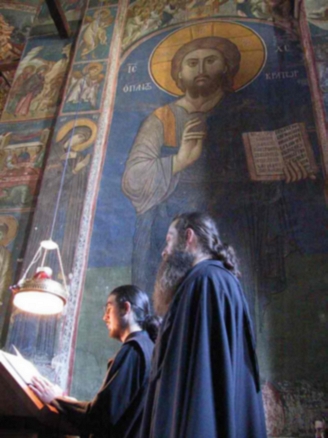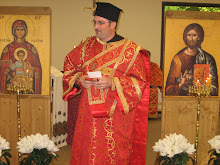 Have been in Dublin since Friday morning. This is my 11th trip. This trip was unique, however, since it was my first opportunity to serve as Deacon at the Ukrainian Greek Catholic Mission in Dublin, Hiero Martyr Nicholas the Wonderworker which is pastored by Archimandrite Serge Keleher. Since I am relatively new to the diaconate, only having been hatched "in grace" some three weeks ago, it was a challenge on many levels.
Have been in Dublin since Friday morning. This is my 11th trip. This trip was unique, however, since it was my first opportunity to serve as Deacon at the Ukrainian Greek Catholic Mission in Dublin, Hiero Martyr Nicholas the Wonderworker which is pastored by Archimandrite Serge Keleher. Since I am relatively new to the diaconate, only having been hatched "in grace" some three weeks ago, it was a challenge on many levels. First of all, Fr. Serge is quite the liturgical expert. He has authored numerous texts and journal articles on various matters liturgical. Just serving under him is an education unto itself!
Secondly, apart from a couple of Irish members, the congregation is almost entirely made up of Ukrainian immigrants to the land of St. Patrick and the predominant language used in the liturgy is Slavonic. Since I am a member of a mission committed to English in the liturgy and since I neither speak nor read Slavonic, I was concerned that as a deacon I might not serve the congregation in its worship as well as I could since I had never sung the Ekteniyas (various litanies of supplication) in any language other than my own! Not to mention the fact that their responses would most certainly be in Slavonic.
Thirdly, I had to adjust to being outside of the "womb" of my diaconal formation at the mission under the watchful guidance of my priest. Now here I was across the ocean serving as a stranger in a strange land in a strange tongue (at least to me)!
So I set about with my gracious weekend host, Declan, to become an educated Ukrainian deacon. My wife, Pani Karen, had been told at my ordination that I was now "half Ukrainian" by virtue of my ordination in the Ukrainian Greek Catholic Church. Like St. Paul, I was "born out of due time" (cf. 1 Corinthians 5:8) in my new and gracious Ukrainian Church family! We deacons are to be Icons of Christ the Servant, and we are formed as such by virtue of the laying on of hands by the bishop and the gift of the Holy Spirit and the grace of apostleship. Just as the Eternal Word "translated" Himself into "human form" by taking our nature so that through His divine accomodation, we might fully receive Him as Savior, I needed to learn the language of the flock I was serving on a temporary basis.
So on Saturday, I spent a good part of the day pouring over the liturgical books that had the Slavonic spelled out phonetically. (Slavonic for deacon dummies!) I wrote in my prayer book some of the key phrases that I would need in order to help facilitate the worship, and not be a distraction. For those who have been to a Byzantine service, you know how the role of the deacon is very visible, even more so in certain ways than the priest. But nevertheless, a good deacon is to be like the angelic hosts who move the universe - you know by faith they are there because the universe moves. Their service, while prominent, is nevertheless transparent. We are to show forth the glory of Christ and help facilitate the worship of the Holy Trinity. If we detract or distract from that, we are not fulfilling our service properly.
Since the Ukrainian Greek Catholic services were at 4pm on Sunday here in Dublin, my friend Declan and I attended a local Russian Orthodox Church (Moscow Patriarchate). I rode the bus and attended the services in my black outer and inner riassas, but stayed mostly to the back of the church, which was truly beautiful. (It was a former Protestant church, which had been sold to the Russians. This type of arrangement is ideal for Eastern missions, since any purchase of an older Latin Catholic parish would involve quite a bit of internal reconstruction to make it suitable for Byzantine use. Protestant sanctuaries are for the most part empty spaces.) Declan and I had watched a video of their services that was on Irish TV, and they had a marvelous deacon. I knew I had to go and see him serve as a deacon first hand.
All I can say is that it was marvelous...more than I could have expected. I had served as a Byzantine acolyte for over 10 years, but only spent 4 months with the deacon who originally trained me. He, Fr. Deacon Justin, of blessed memory, fell asleep in the Lord 4 months after I started serving. Up until that point, having a deacon at the Divine Liturgy was a treat, not a regular occurence, as it should be in every parish.
So I watched my Orthodox brother deacon serve his congregation with angelic grace and ease. His sense of calm and prayerfulness throughout was an inspiration to me personally. Unfortunately, I did not have a chance to meet him personally after the service. He was behind the iconostasis (the large icon wall at the front of the church) consuming the Holy Gifts, while I was venerating the handcross and speaking with the pastor. My politically astute friend, Declan, then wisked me out of the church, despite the gracious invitation of the priest to stay. Some Russians had figured out that I was an Eastern Catholic (they refer to us as "Uniates" which is a pejorative term. It comes from our Mother Church's acceptance as an Orthodox Church of the "unia" between Kyiv and Rome.) and Declan was concerned that they might think I was there to "spy" on their congregation since they had lost so many to Fr. Serge's mission, for reasons charity precludes me from sharing.
I freely admit, though, that I was there to "spy", but only on my marvelous brother deacon. God grant him many years!
So the time came for the services at the Ukrainian parish, and, with the Russian Church so fresh in my mind, I set about to serve my Ukrainian and Irish brothers and sisters. Only a few flubs (some pages were stuck together and I moved from the dismissal of the Catechumens into the tail end of a doxology, which is a prayer reserved to my brother priests!). All in all, though, it seemed to go well. During the Ektenyas, for instance, I blended English and Slavonic. I began the prayer with English, such as "For this holy house and for all who enter with faith, reverence and the fear of God...," but then I concluded with the Slavonic version of "Let us pray to the Lord!" which is "Hospodu pomolimsya!" to which the congregation responds, "Hospodi pomiluj!" ("Lord have mercy!"). When in my ignorance I could not conclude with the Slavonic, I could tell that it threw the rythm of the cantor and the congregation off a bit at first. Eventually, the "synergy" of deacon, cantor and congregation all engaged in the hymn of praise worked very well. Father Serge mentioned that it was the first time they have used English in the Liturgy for almost 15 years. Quite a thing where Slovonic, Gaelic and Greek can be heard every Sunday at St. Kevin's Chapel in St. Mary's Pro-Cathedral where the liturgy takes place.
The lessons learned?
First of all, to be an apostle one must never stop learning. And diaconal learning, as it is with all forms of apostleship, is decidedly a fraternal experience.
Secondly, I must always rely on the Holy Spirit, given at ordination, to help me lead the worship...the same Spirit of Pentecost who graced the apostles so that the same Gospel could be heard in the tongues of the people.
In ICXC,
Fr. Deacon Daniel


1 comment:
Well done Father Deacon! I can't believe that three weeks have gone by since we gathered at Pokrova for your ordination. Axios!
Post a Comment